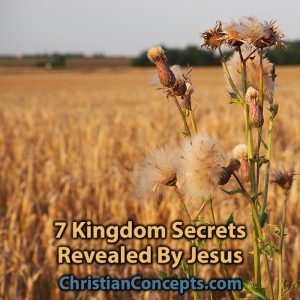Matthew 13 contains 7 parables that Jesus admits are Kingdom secrets (13:11). When Jesus tells stories about God’s Kingdom, He is speaking about heaven. The Kingdom of Heaven can be best described as having growth, value, and exclusivity.
A dichotomy appears in every story that Jesus tells. Jesus teaches us about heaven by using strong contrasts. It seems like He doesn’t want there to be any room for ambiguity. The people who listen to His stories are without excuse because He speaks plainly enough. Yet, Jesus emphasizes that people can be divided into two groups: those who can understand Him (the Good) and those who listen to Him but can’t hear or understand Him (the Bad) (13:13).
Good and Bad have other relevant labels that Jesus uses throughout Chapter 13:
- Good and Evil
- Haves and Have Nots
- Understanding and Confused
- Seeing and Not Seeing (Blind)
- Hearing and Not Hearing (Deaf)
- Open Minds and Stubborn Minds
- Turn to God and Turn Away from God
- Fruitful and Barren
- God-planted and Enemy-planted
- Saved/Selected and Unsaved/Rejected
- Preserved and Destroyed
Kingdom Growth Parables
Secret #1: Receptive Hearts Required
In the Parable of the Sower (13:3-9, 18-23), Jesus divides people into those who have “good soil” and those who have “bad soil.” Only those with receptive hearts (good soil) are in God’s Kingdom.
Secret #2: Jesus’s Good Seed Required
In the Parable of the Weeds (13: 24-30, 36-43), Jesus divides people into those who come from “good seed” and those who come from “bad seed.” There are actually two farmers planting seeds in the same garden (the world). The good farmer plants good seeds. The bad farmer plants bad seeds. Only those planted by Jesus will make it into heaven.
Secret #3: Humble Beginnings Lead to Powerful Endings
In the Parable of the Mustard Seed (13:31-32), Jesus contrasts the smallness of the seed with the largeness of the outcome. He is saying that size doesn’t matter and can even be misleading. Appearances can be deceiving. A lot can come from a little. That’s part of God’s design. Jesus is the perfect example of this, being born in a manger.
Secret #4: Reaches Everywhere
In the Parable of the Yeast (13:33), Jesus continues the theme of humble beginnings by describing His kingdom as starting in one place but with the ability to spread everywhere. There is no place that it cannot reach (Psalm 139:7-8).
Kingdom Value Parables
Secret #5: Source of Greatest Joy
In the Parable of the Hidden Treasure (13:44), Jesus emphasizes that His Kingdom provides the greatest personal fulfillment possible. It’s worth pursuing at all costs. It’s worth giving up everything to obtain it.
Secret #6: Worth More Than Anything You Own
In the Parable of the Pearl of Great Value (13:45-46), Jesus emphasizes that His Kingdom has a greater value than anything you can own. It’s worth going all in to obtain it. The value is in the quality and rarity of the item. Nothing else comes close to heaven. It is beneficial in every way.
Kingdom Exclusivity Parable
Secret #7: Some Will Inherit It and Some Won’t
In the Parable of the Fishing Net (13:47-50), Jesus returns to the theme of dichotomy to summarize His main teaching point. People will be sorted into two groups: the ones selected for the Kingdom and the ones rejected from the Kingdom.
What is the main message behind all these secrets? It’s in what Jesus says to His disciples after they are alone. If Jesus is speaking to you and you can understand what He is saying, then you are blessed!
I have explained the secrets about the kingdom of heaven to you, but not to others.
Matthew 13:11,16,17 CEV
But God has blessed you, because your eyes can see and your ears can hear! Many prophets and good people were eager to see what you see and to hear what you hear. But I tell you that they did not see or hear.
Rejoice that you can see, hear, and understand!





